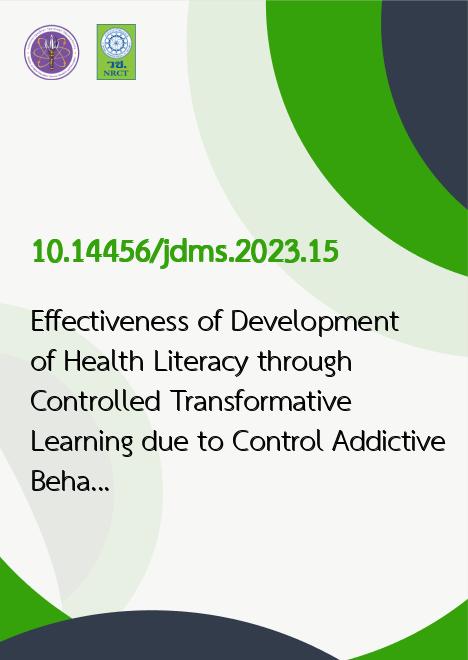
|
Effectiveness of Development of Health Literacy through Controlled Transformative Learning due to Control Addictive Behavior among Methamphetamine Addiction Patients: Addiction Services-center in Department of Medical Services, Thailand |
|---|---|
| รหัสดีโอไอ | |
| Creator | Nanta Chaipichitpan |
| Title | Effectiveness of Development of Health Literacy through Controlled Transformative Learning due to Control Addictive Behavior among Methamphetamine Addiction Patients: Addiction Services-center in Department of Medical Services, Thailand |
| Contributor | Watcharee Meesil, Seearoon Lampoo |
| Publisher | สำนักวารสารกรมการแพทย์ |
| Publication Year | 2566 |
| Journal Title | Journal of the Department of Medical Services |
| Journal Vol. | 48 |
| Journal No. | 1 |
| Page no. | 121-131 |
| Keyword | Health Literacy Program, Transformative Learning, Methamphetamine Addictive Behaviors, Addiction Services-Center |
| URL Website | https://he02.tci-thaijo.org/index.php/JDMS |
| Website title | วารสารกรมการแพทย์ |
| ISSN | 2697-6404 |
| Abstract | Background: Health literacy is the cognitive and social skills that affect a person's motivation and ability to access, understand, and use information to promote and maintain health. It is one of the main strategies of the Ministry of Public Health. Objective: To develop and study the effects of a health literacy development program through transformative learning for changes in drug addiction behavior. Methods: It was a developmental research consisting of 4 phases including 1) to study the situation of health literacy and literature review for the program development 2) to create the development program 3) to conduct a quasi-experimental research to study the effect of the program on methamphetamine-addicted patients 4) to study the feasibility of implementing the program to routine work. Chi-Square, Fisher's exact, paired t-test, independent t-test, and repeated ANOVA were used to analyze data. Results: 1) Methamphetamine-addicted patients had the mean scores for all aspects of health literacy at a moderate level. The ages of the patients were younger. There were changes in the nature of methamphetamine use, In addition, there were more psychological complications. 2) The health literacy program consisted of 6 activities. 3) After the experiment, the experimental group's mean scores on health literacy, quality of life, and intention to drug avoidance were higher than those before the experiment. and were significantly statically higher than those in the control group. Additionally, after one month of follow-up, 100% of the experimental group did not have substance abuse. 4) Patients and nurses were highly satisfied with the program. It is possible to implement such a program in routine work. Conclusion: Health literacy development programs can transform methamphetamine addiction behavior. Therefore, nurses should gain knowledge and skills about substances health literacy provided through a transformative learning process and implement it in patients with substance abuse. |